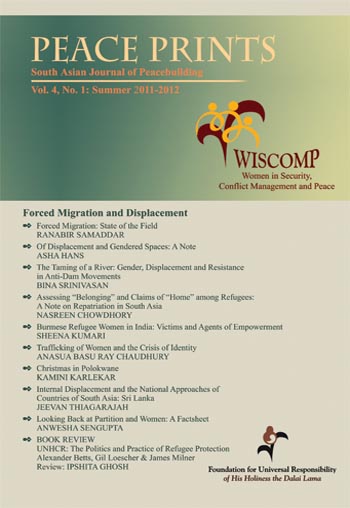
| » |
Editorial
Paula Banerjee Read More... |
| » |
Forced Migration: State of the Field
Ranabir Samaddar Read More... |
| » |
Of Displacement and Gendered Spaces: A Note
Asha Hans Read More... |
| » |
The Taming of a River: Gender, Displacement and Resistance in Anti-Dam Movements
Bina Srinivasan Read More... |
| » |
Assessing "Belonging" and Claims of "Home" among Refugees: A Note on Repatriation in South Asia
Nasreen Chowdhory Read More... |
| » |
Burmese Refugee Women in India: Victims and Agents of Empowerment
Sheena Kumari Read More... |
| » |
Trafficking of Women and the Crisis of Identity
Anasua Basu Ray Chaudhury Read More... |
| » |
Christmas in Polokwane
Kamini Karlekar Read More... |
| » |
Internal Displacement and the National Approaches of Countries of South Asia: Sri Lanka
Jeevan Thiagarajah Read More... |
| » |
Looking Back at Partition and Women: A Factsheet
Anwesha Sengupta Read More... |
| » |
Book Review UNHCR:The Politics and Practice of Refugee Protection (Second Edition) Reviewed by: Ipshita Ghosh Read More... |
Paula Banerjee is currently Associate Professor, Department of South and Southeast Asian Studies, University of Calcutta, and affiliated with the Women's Studies Research Centre, University of Calcutta. An author of numerous works on gender and conflict, Dr. Banerjee's latest books include Women in Indian Borderlands (2011, Sage), which she co-edited with Anusua Basu Ray Chaudhary and Women in Peace Politics (2008, Sage). Dr. Banerjee was granted a PhD from the University of Cincinnati, USA and has worked previously as Lecturer in history, Sarojini Naidu College for Women, University of Calcutta and has been a WISCOMP Scholar of Peace fellow and Visiting Professor, University of Paris.
Conatct:
paula@mcrg.ac.in
Contact Us
Archives
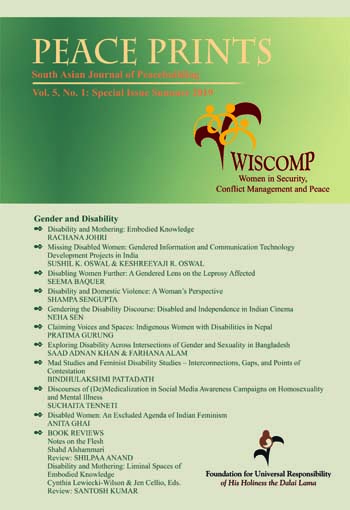 |
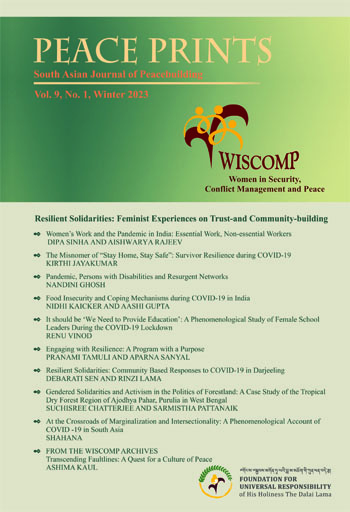 |
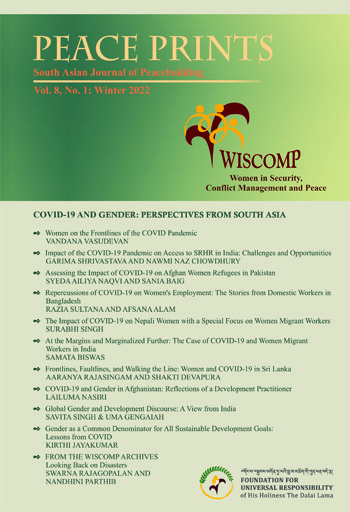
|
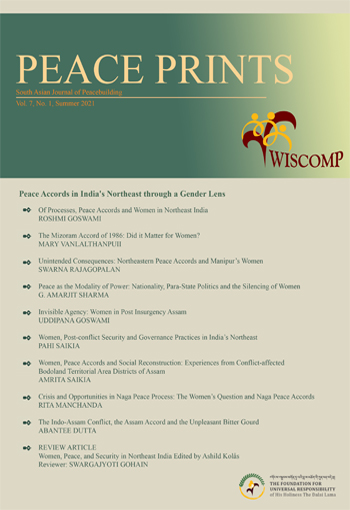
|
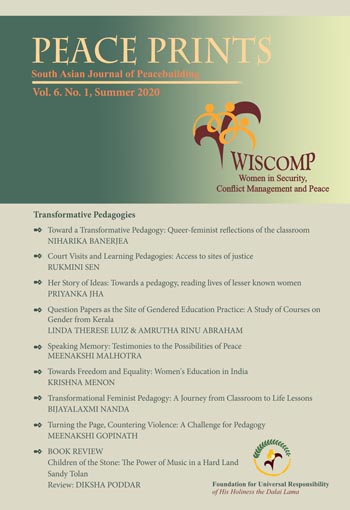 |
|
Being "(Re) Armed": Women and the Security Sector
Volume 10, No. 1, 2024 |
Resilient Solidarities: Feminist Experiences on Trust-and Community-building Volume 9, No. 1, 2023 |
COVID-19 and Gender: Perspectives From South Asia Volume 8, No. 1, 2022 |
Peace Accords in India's Northeast through a Gender Lens Volume 7, No. 1, 2021 |
Transformative Pedagogies Volume 6, No. 1, 2020 |
 |
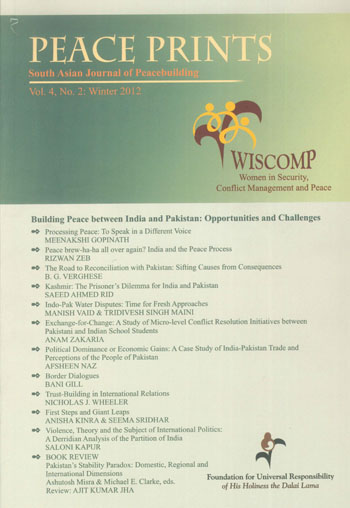 |
 |
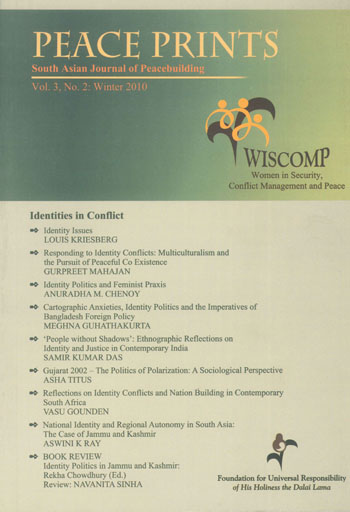 |
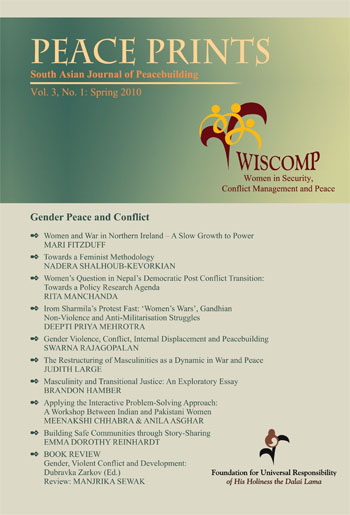 |
|
Gender and Disability
Vol. 5, No. 1, 2019 |
Building Peace between India and Pakistan
Vol 4, No 2, 2012 |
Force Migration and Displacement Vol 4, No 1, 2011-12 |
Identities in Conflict
Vol 3, No 2, 2010 Special Edition |
Gender Peace and Conflict
Vol 3, No 1, 2010 |
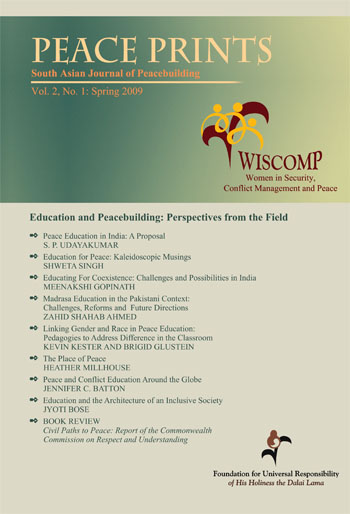 |
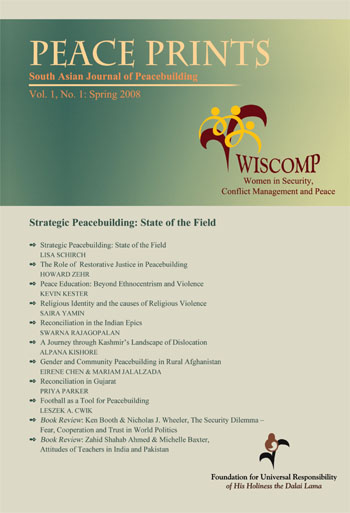 |
|||
| Education and Peacebuilding Vol 2, No 1, 2009 |
Strategic Peacebuilding: State of the Field
Vol 1, No 1, 2008 |
Returning with a Renewed Mission!
Peace Prints is back after a hiatus of six years with a renewed mission to enhance its footprint not just in South Asia but beyond. In keeping with the expansion in the domain of Peacebuilding, Peace Prints has expanded its scope to include the emerging frontiers of scholarship and research. The organizational and funding constraints have been overcome. In this new phase of reorganization, we infuse this pioneering effort with the energy that comes with expanding circles of engagement and linkages to wider networks of both experienced and younger researchers.About WISCOMP
WISCOMP, an initiative of the Foundation for Universal Responsibility has been a pioneer in initiating the discourse on women, peace, and security in South Asia. It was at the forefront of engaging with these issues, well before they found articulation in the UN Security Council Resolution 1325 in October 2000. Its efforts have yielded a robust network across borders and boundaries that highlight the leadership of women in the areas of peace and security—a space that was hitherto not fully encouraging of the participation of women.WISCOMP is an initiative of the Foundation for Universal Responsibility, which was established with funds from the Nobel Peace Prize awarded to His Holiness The Dalai Lama in 1989.
For more information, visit www.wiscomp.org

